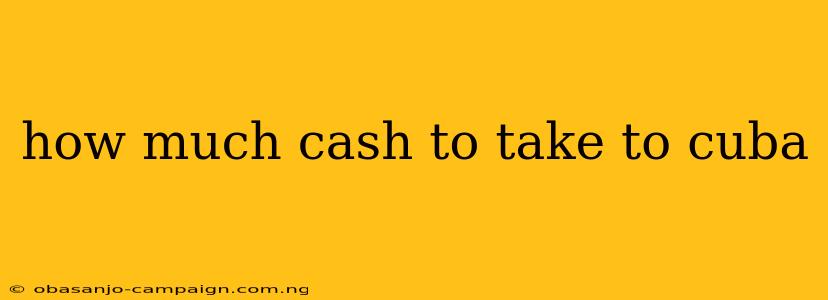How Much Cash to Take to Cuba: A Comprehensive Guide for Travelers
Traveling to Cuba can be an exciting and enriching experience, but planning your finances is crucial. While Cuba has been making strides towards a more modern economy, cash remains king. This means knowing how much cash to take to Cuba is essential for a smooth and enjoyable trip. This guide will delve into the intricacies of currency exchange, spending habits, and practical tips to help you determine the right amount of cash for your Cuban adventure.
Understanding Cuban Currency
Cuba utilizes two official currencies: the Cuban Peso (CUP) and the Cuban Convertible Peso (CUC).
Cuban Peso (CUP): The CUP is the local currency, used primarily for everyday transactions like public transportation, street food, and local markets.
Cuban Convertible Peso (CUC): The CUC is pegged to the US dollar and is used for tourist-related services like hotels, restaurants, and tourist shops.
How to Exchange Currency
1. Exchange Currency Before You Go:
- You can exchange currency at banks, exchange bureaus, and some hotels in your home country before departing.
- It's generally advisable to exchange a portion of your funds before arriving, as this can often be more convenient and save you time upon arrival.
2. Exchange Currency Upon Arrival:
- When you arrive in Cuba, you can exchange your currency at designated exchange bureaus (CADECA) located at airports, hotels, and major tourist destinations.
- Be aware that exchange rates may fluctuate, so it's always a good idea to compare rates at different locations before exchanging.
3. Using Credit and Debit Cards:
- While Cuba has been modernizing, using credit or debit cards is still limited.
- Visa and Mastercard are the most widely accepted cards, but they may not be accepted everywhere.
- It's highly recommended to use cash for most of your transactions.
- Cash advances from ATMs are possible, but they often come with high fees and limited availability.
Estimating Your Expenses
1. Accommodation:
- The cost of accommodations in Cuba can vary significantly depending on the type of lodging and location.
- Budget-friendly options like hostels and casa particulars (private homes offering rooms) can range from $20-$50 per night.
- Mid-range hotels and resorts typically range from $50-$150 per night.
- Luxury hotels can cost upwards of $200 per night.
2. Food:
- Cuban cuisine is delicious and affordable.
- Simple meals at paladares (family-run restaurants) or local eateries can cost around $5-$10 per person.
- More upscale dining experiences at restaurants in tourist areas can range from $15-$30 per person.
- Street food, like sandwiches and empanadas, is a great way to sample Cuban flavors on the cheap.
3. Transportation:
- Public transportation in Cuba is affordable and efficient.
- Local buses and taxis can cost around $1-$3 per ride.
- For longer distances, you can opt for intercity buses, which are also relatively inexpensive.
- Hiring private taxis or rental cars can be more expensive.
4. Activities and Attractions:
- Cuba offers a diverse range of activities and attractions to suit every interest.
- Some attractions, like museums and historical sites, may have admission fees ranging from $5-$15.
- Tours, excursions, and other activities can vary in cost.
5. Miscellaneous Expenses:
- Factor in expenses like souvenirs, snacks, drinks, and tips.
- It's always a good idea to have a small amount of cash for unexpected expenses.
How Much Cash to Take to Cuba: A Breakdown
Here's a general guideline for estimating your cash needs, based on a 7-day trip:
- Budget Traveler: $500-$700
- Mid-Range Traveler: $800-$1,200
- Luxury Traveler: $1,500-$2,000+
Important Notes:
- These estimates are just a starting point.
- Your actual expenses will depend on your travel style, accommodation choices, and activities.
- Consider budgeting for extra cash for unexpected expenses.
Tips for Managing Your Money in Cuba
- Carry smaller denominations: It's helpful to have a mix of smaller bills for easier transactions.
- Always confirm prices: Be sure to clarify the currency (CUC or CUP) when making a purchase.
- Negotiate: Bargaining is common in Cuba, especially at local markets and shops.
- Avoid using credit cards: As mentioned earlier, credit and debit card usage is limited.
- Be wary of scams: As with any tourist destination, be vigilant about scams and fraudulent activities.
Conclusion: How Much Cash to Take to Cuba: A Detailed Guide
Cuba's unique economic landscape makes planning your finances crucial. By understanding the currency exchange process, estimating your expenses, and following our tips, you can confidently navigate your finances while exploring the vibrant culture and attractions of Cuba. Remember to pack enough cash to ensure a seamless and enjoyable trip.
